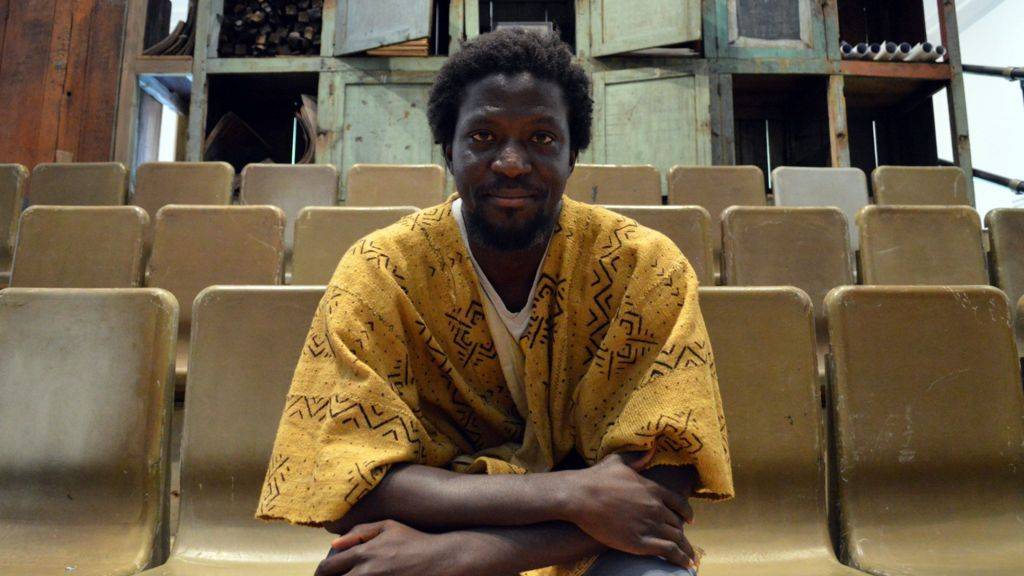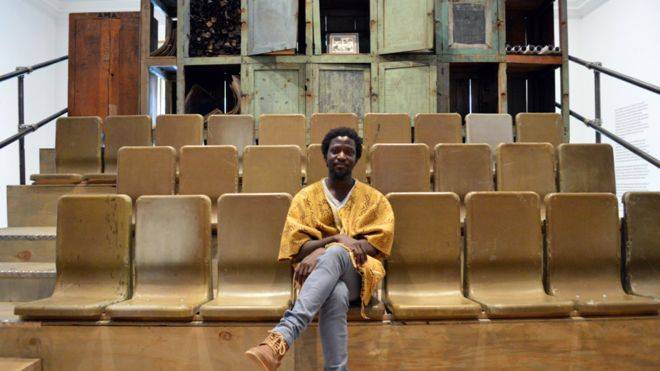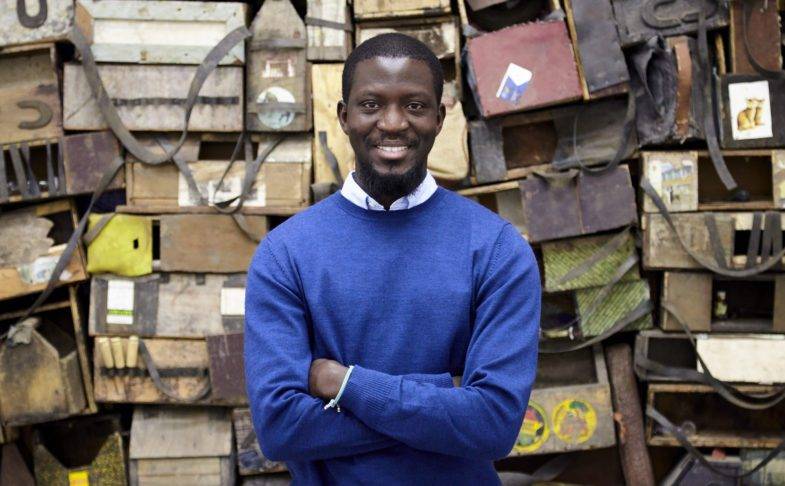Everyone Is Raving About The “Parliament of Ghosts” – Meet The Man Who Took History’s Relic From Tamale To Manchester

Ibrahim Mahama is building a parliament with recycled train seats and cabinets. These were salvaged from abandoned trains from back in the day.
It was the year 1957 when Ghana extricated itself from the grip of its colonial masters. Before then, the Brits had the run of the place and even as they were far from the ideal masters (if there is any such thing), they still had their moments.
And one of those ‘moments’ could be found in their effort in building Ghana’s train system — even though it was pretty much built on the backs of the rail workers who were actually instrumental in the campaign for independence.
At one time, Ghana’s train system worked like a modern-day German train schedule and when the Brits finally packed up and left, there was a lot of buzz around expanding the train system built under British colonial rule.
But all that optimism somehow faded with the dawn of independence. Economic struggles became the order of the day and military coup after military coup only made matters worse. And so it happened that the railways were neglected for decades and consequently suffered decay — except that the decay was mostly in figurative terms.
In reality, the abandoned train systems just became a grotesque picture of battered, rusted metal and worn plastic. It was not a pleasant sight. And for a very long time, those abandoned trains seemed destined to remain ugly relics of a forgotten past. But that was until someone figured an unusual way to get them to work again.

Source: bbc.co.uk
Ibrahim Mahama, a Ghanaian who is one of Africa’s most exciting young artists, has salvaged, repurposed, and transformed hundreds of worn plastic second-class train seats and dilapidated wooden lockers that were left to rot for decades, into a work of art that has actually found its way into an art gallery in Manchester, United Kingdom.
By collecting objects most people would discard as useless and putting together artwork that would get into any art gallery from Accra to Paris, the young man is undoubtedly scribbling his name in both local and international folklore. And the good part is that he’s trying to tell a story of his own too.
Ibrahim Mahama salvaged hundreds of old train seats and several dozen old lockers once used by train workers. He was able to repurpose those to create a four-sided replica of the chamber of the Ghanaian parliament which now sits at the Whitworth gallery in Manchester and is currently something of a centre of attraction at the gallery.
He calls his creation “Parliament of Ghosts” — somewhat ominous but borne out of a realistic story. The ghosts, as he tells the BBC, are the opportunities his home country failed to grasp over the years, and the train seats and railway workers’ lockers are symbolic to that story.
Parliament of Ghosts represents the “potential of a country that was yet to manifest itself, but never came to be, in a way,” Mahama says. The seats and other objects carry the memories of everything they have witnessed and been through, he believes. “They embody all of it.”
It’s a similar story for the lockers. The cabinets once served as storage for workers’ tools, clothes, and stuff. They, thus, hold a lot of sweat from the restoration of trains and the dismantling that happened over the years.
He says; “The cabinets almost become these living organisms that witness the entire life cycle of generations upon generations of how a certain system has somehow been maintained – but at the same time the flaws of it. I like to think they are living things that somehow can speak in a language that the workers themselves cannot.”
But the flaws of Ghana’s past governments are not the only things represented by this work of art. The artist says it highlights the shortcomings of parliaments around the world, needless to mention the struggles of the parliament of the United Kingdom with the currently deadlocked Brexit talks. “Parliament of Ghosts is a question of what potential lies within the failures of the world,” Mahama says.
As an additional spice to the story being told, the repurposed train seats and cabinets are thought to have originally been manufactured in Manchester — the same place they have now been taken to — which makes their return quite symbolic.
With this development, the fast-rising Ghanaian artist has scored his first major U.K. exhibition — commissioned by the Manchester International Festival. The Parliament of Ghosts is open to individuals and available for hosting debates, performances, and auditions.
With many more train seats and cabinet still lying fallow back home, Ibrahim is looking at putting them to use in a similar way. He hopes to create a much larger version of the parliament at the arts centre he set up recently in his home town of Tamale, Ghana.
Ibrahim Mahama also runs an institute known as the Savannah Centre for Contemporary Art. Through this organisation, he is working on initiatives to help with agriculture, housing, and education.
Now 32, his stock has risen meteorically and he’s become a hot prospect in Europe and beyond. Besides being represented by the prestigious White Cube gallery in London, he was the youngest of six artists to exhibit in the first Ghanaian pavilion at the Venice Biennale, which took place early this year.

On previous occasions, he has created artworks out of hundreds of wooden toolboxes used by shoe shiners, and by covering buildings in jute sacks that had been used to carry cocoa, maize, and charcoal.
Not too long ago, he also used the sacks to replace the flags outside the United Nations’ headquarters at the Rockefeller Center in New York. He describes this act of replacing flags with decaying food sacks as a way of reminding the world of what he calls a “global condition.”
Ibrahim Mahama is not your average artist, His love for antiquity and reverence for history has turned him into some kind of collector of older objects — especially the decaying and stained ones.
“That’s what I find value in,” the artist says. “The memory and the pattern is something that speaks to us – rather than when a thing is very new, and it almost has no soul to it.”
Part of his Manchester exhibition also includes an imitation of the concrete silos that were erected in Ghana in the late 1950s to store cocoa beans before they were processed, but which remained empty. There are also battered Ghanaian wooden school bookcases which Ibrahim was able to collect after offering to make new furniture for the schools as a replacement.
Featured Image Courtesy: bbc.co.uk